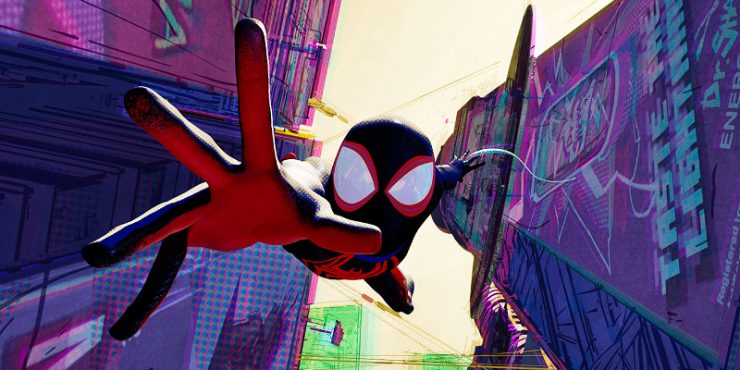WARNING Although I only speak theoretically, the main conceit of this review might be seen as a **SPOILER**, so any and all people who want to avoid that as much as possible should probably not read. Now, to proceed:
If Spider-Man: Across the Spider-Verse and it’s predecessor, Into the Spider-Verse, prove anything, it’s that there is an inherent value to a movie that just looks cool as hell. The Spider-Verse films mix a multitude of animation styles, all while maintaining a baseline form that sits between traditional comic panels and New York graffiti chic. The producing duo of Phil Lord and Christopher Miller have a proven track record with having fresh takes on well-worn brands, particularly within the realm of animation, and their patented gag-o-rama comedic style means the humor is always keeping pace with the eye-popping visuals, a plate-spinning act they’ve perfected over several movies.
I found 2018’s Into the Spider-Verse to be an endlessly entertaining film, a remarkably creative take on a franchise that continues to be forced upon us against our will. Being the fourth iteration of Spider-Man in a twenty year span felt especially fatiguing, but the introduction of Miles Morales and his maraud of Spider-Men/Women/Pigs was a welcome surprise. There’s always been an issue with Marvel and sequels. For every fantastic Avengers, there’s an equally uninspiring Age of Ultron. Across the Spider-Verse had a whole five years to follow up the original, and it’s obvious that in the mean time, there was a lot of story that was created, so much so that one film simply isn’t enough.
The most consistently disappointing part of our endless era of comic book superhero films is the reluctance to commit to a complete story. It’s too tempting – and, I’d guess, more profitable – to instead promise more in the future than you can deliver at the moment. The endless carrot-and-stick of these narratives can feel a bit like a cheat, and it almost hurts to see Across the Spider-Verse fall into that trap. The script (written by Lord, Miller, and David Callaham) is a 140-minute first act, a perpetual build up with no pay-off. We do get an expansion of the Spider-Verse, and directors Joaquim Dos Santos, Kemp Powers, and Justin K. Thompson take full advantage of what that world can look like. Unfortunately, there’s not much else below the surface.
We open with Gwen Stacy (Hailee Steinfeld), over a year after helping Miles (Shameik Moore) destroy the Alchemax collider and returning to her universe and resuming her role as Spider-Woman. When a tragedy causes her to be at odds with her police captain father (Shea Whigham), she decides to leave her world and join the Spider-Society under the tutelage of fellow spider-people Jessica Drew (Issa Rae) and Miguel O’Hara (Oscar Isaac). They travel the various universes, correcting anomalies that might disrupt the balance of time and space. When Gwen gets a chance to visit Miles’ universe, on a mission to hunt a new villain called The Spot (a hilarious and underused Jason Schwartzman), she decides to visit her old friend despite explicit instructions not to.
For Miles, life as the one Spider-Man in his universe has proved hard to balance against school and his other teenaged duties. His father, Jeff (Brian Tyree Henry), is about to be promoted to police captain and his mother, Rio (Luna Lauren Vélez), is worried that Miles is growing distant. Hiding his superhero identity from his parents only makes the tension between them worse. When Gwen makes her surprise visit, it’s not just that his crush on her makes a jump in to the Spider-Society appetizing, but it also represents an escape from his stressful double life. Jessica and Miguel see no value in bringing Miles on, but he manages to follow Gwen through the portal that brings him in touch with yet another new world.
The Spider-Society is the film’s shining achievement. It contains a multi-layered cavalcade of Spider-Men, each unique to their universes, and each giving the film a chance to make a passing joke within a parade of action and humor. It also reintroduces the first film’s jaded Peter Parker (Jake Johnson), Miles’s cynical mentor turned new dad. Miguel is furious that Miles has snuck his way into their society; his maniacal obsession with keeping order and balance makes him paranoid about any major changes in his operation. While Peter and Gwen try to argue Miles’s case, Miles himself learns some unsettling truths about life as a Spider-Man. Add to that, The Spot’s continued threat to the existence, Across the Spider-Verse really builds itself into a true turducken of plot.
I found this film wanting. For all its attempts at humor, the jokes felt extremely watered down by the narrative burden of its over-saturated script. Across the Spider-Verse often dazzles in its action set pieces and its innovative world-building, but its story is stretched so thin that there’s hardly any dramatic effect. Even its emotional appeals are double stacked, neutralizing Gwen’s relationship with her father against Miles’s relationship with his. That the movie never finds comfort with choosing one plot line over the other means that there’s only one conclusion this could lead to: the dreaded “to be continued”. The ending of this film felt like a forfeit after two hours of exposition. If you’re not expecting it, you could be sitting in the theater worrying if this movie will ever get to the point. It doesn’t.
Directed by Joaquim Dos Santos, Kemp Powers, and Justin K. Thompson










